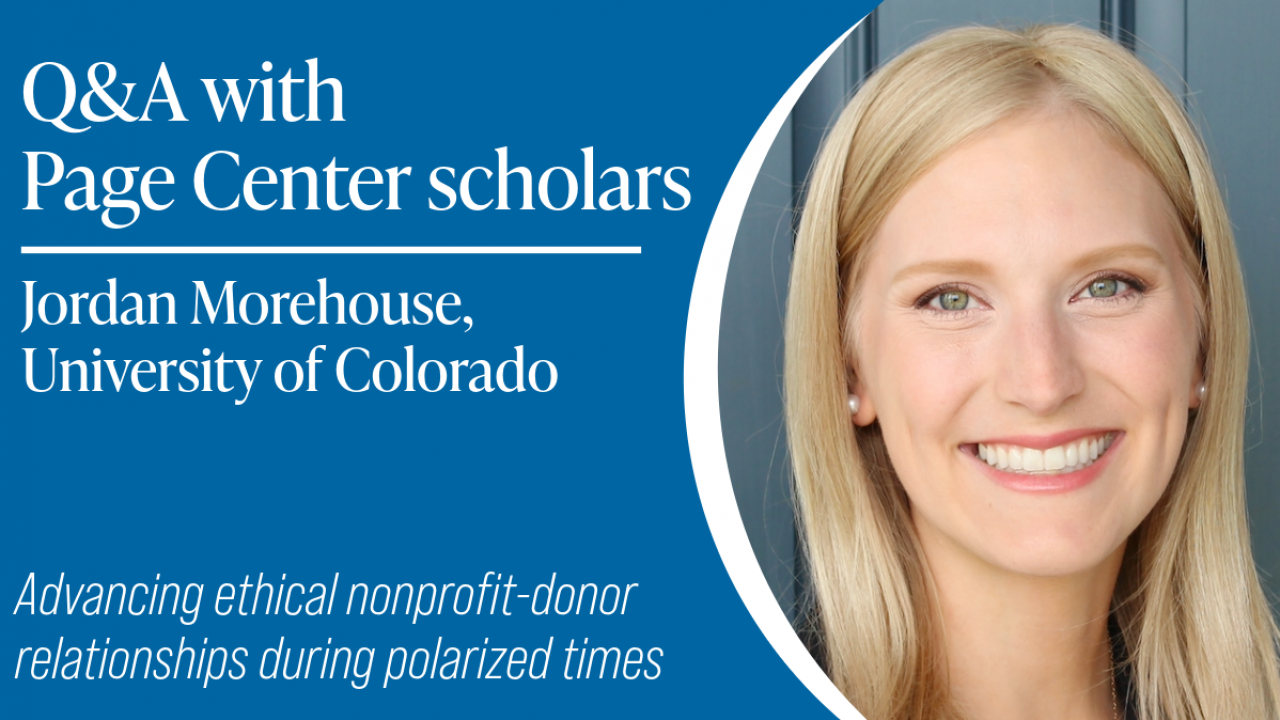October 03, 2024
Theory-backed support for nonprofit communicators – Scholar Q&A with Jordan Morehouse

Nonprofit organizations face increased pressure to take stands on, at times, hot button issues. The issues can sometimes be unrelated to the mission of the organization, which complicates the ability to build and maintain relationships with donors. Two-time Page Center scholar Jordan Morehouse, University of Colorado; two-time scholar and former Page Center graduate student Virginia Harrison, Clemson University; and three-time scholar Chuqing Dong, Michigan State University, are building an ethical framework that will help nonprofits navigate polarizing issues while maintaining relationships with donors. Their project is part of the Page Center’s 2024 research call on expanding theory for integrity in public communication. In this Q&A, Morehouse talks about how the project will integrate three theoretical perspectives to advance public relations theory and offer guidance to nonprofit communicators so they can address real-world challenges.
How did your collaboration come together and how did it lead to this grant?
We started talking about working together about two years ago. In the past few years, I’ve worked with Chuqing on a project focused on ethics of care and relationship management, and I’ve worked with Virginia on a project focused on stewardship and higher educational institutions. When the three of us got together about two years ago, we realized that there was clear overlap in these areas that we've been studying, and there was a very practical problem that we could address by joining these frameworks together. That's how this project came about.
We were talking about problems that we're seeing in society and problems that public relations practitioners at nonprofit organizations are facing. We all care about helping practitioners cope with communication, management, and relationship issues. We also care deeply and are motivated by advancing public relations theory in a way that's innovative and interesting. We’re very aligned in our goals and interests.
How does theory address these challenges practitioners are facing?
The challenges that you're referring to is polarization that we're seeing in society. We are seeing and hearing that donors of nonprofit organizations are demanding that nonprofits release statements and take sides on issues and topics that are either unrelated or tangentially related to the mission of that organization. Nonprofit organizations feel stuck. They don’t want to alienate donors and many nonprofits don’t know what to do.
Can you talk about the theories you are using?
We haven't seen research that connects the three frameworks we include in this study: dialogic stewardship, relationship management and ethics of care. Relationship management theory is a well-known theory in public relations scholarship that essentially proposes that organizations strive to cultivate and manage mutually beneficial relationships between entities. Often, scholars study the relationship management efforts organizations take towards specific publics, like employees, consumers, activists, volunteers, etc. Dialogic stewardship incorporates dialogic theory into stewardship, and it consists of five dimensions, including reporting on responsibility, strategic recognition, engagement, financial stability and organizational values. Lastly, ethics of care is a feminist ethical framework that prioritizes relational humanity, connectedness and genuineness in interactions and relationships.
How do they overlap?
These three frameworks overlap through the prioritization of relationships. Relationship management theory focuses on the relationships that occur within an organization’s ecosystem, like multistakeholder relationships, organization-public relationships, and even intra-public relationships. On the other hand, ethics of care focuses on characteristics of the relationship, communication, outcomes, and intent of relationships, like transparency, protection of vulnerability, authenticity, and thoughtfulness. Lastly, dialogic stewardship is a concept that prioritizes relationships, but in a specific context, namely the relationships between non-profit organizations and donors. Similar to relationship management theory, dialogic stewardship also focuses on how to cultivate and maintain these relationships through certain actions and orientations.
Can you expand on the timeliness for a project like this?
As polarization in society increases, the need to re-examine organization-donor relationships in the nonprofit sector becomes more critical as nonprofits must account for diverse donor attitudes, values, and beliefs beyond the scope of their specific missions. This presents a new reality as part of donor relations. So, this project is timely because we’re studying this new reality of donor relations, and joining one new concept (dialogic stewardship), with a popular ethical framework in public relations scholarship (ethics of care), and a legacy theory in PR (relationship management).
What are your plans for this project?
We are planning on using a survey to examine how donors perceive nonprofit communication in a polarizing environment. Our funding will help us collect a sample of at least 500 nonprofit donors. We're focusing on the United States in particular, because of the U.S.’s unique positioning of the charitable sector as a driver of societal wellbeing in lieu of government assistance.
What do you expect or what do you hope to see when this project concludes?
Thinking about the outcomes of this project is what drives me. We are hoping to have some journal articles and conferences come out of this where we present this research to public relations scholars. We want to contact nonprofit organizations and give them the results of our studies and present the results to executive directors and communication practitioners. These practitioners are doing such incredible work in our communities. We want to support them.
What is the Page Center’s role in making this project happen?
This research wouldn't be possible without the Page Center. Obtaining a quality survey sample is expensive, especially when you have these specific parameters – for us, it’s nonprofit donors in the United States. Our research relies on the nationwide representative sample in order to get the most useful results. The Page Center has already given us so many fantastic opportunities for feedback and just networking with other people who care deeply about problems that nonprofit organizations are facing. So, it’s not just the money, it's these incredible opportunities to talk with other people who care about the same problems that we care about and who are invested in and passionate about these topics and issues.
